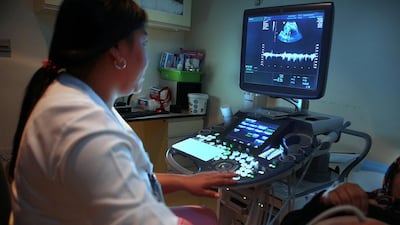ABU DHABI // A screening programme for a genetic immune-deficiency condition in newborns could save babies' lives, doctors in Abu Dhabi have said.
The doctors suggest that adding severe combined immunodeficiency (Scid) to the country’s infant-screening programmes could greatly increase survival rates through early diagnosis and treatment.
Babies with Scid have compromised immune systems caused by missing or weak white-blood cells. This leaves them vulnerable to serious and life-threatening infections.
“The benefits of an early diagnosis are significant and could have cost savings as well,” said Dr Zain Al Yafei, deputy service lead immunologist at Sheikh Khalifa Medical City.
No data is available for the prevalence of Scid in the UAE but a study in Saudi Arabia suggested that the rate is much higher there than in other countries, Dr Al Yafei said. The study screened about 90,000 newborns and identified 19 babies with Scid, 11 of whom died.
That equates to about 1 in 5,000 babies, compared with 1 in 75,000 to 100,000 in the US, Dr Al Yafei said, attributing the difference to higher rates of sexual relations between blood relatives in the Arabian Gulf.
“This is not unexpected,” he said.
The success rate in treating infants after an early diagnosis can be very high, said Dr Gehad ElGhazali, service lead immunologist at SKMC. Early diagnosis, however, is less likely without screening at birth. Neonates with Scid can appear to be healthy because in early infancy they are still protected by antibodies from their mother.
Parents may at first think infections they contract are normal. But babies with Scid usually have frequent infections in their first six months that can be much more severe than in newborns with normal immune systems.
A common infection for an otherwise healthy baby is life-threatening for a child with Scid. Babies with Scid who do not receive treatment are likely to die before they reach their first birthday.
When treated early, the survival rate is more than 95 per cent, said Dr Al Yafei. But after four months, this drops to between 40 and 60 per cent.
“So it’s very important to diagnose at this early stage,” he said.
The disease is commonly known as bubble-baby disease because its sufferers are sometimes forced to live inside sterile environments protected by plastic.
Treatment most often consists of bone-marrow transplants. The new bone marrow, from a compatible donor, allows the baby to produce T cells, which can recognise and attack germs and coordinate the body’s immune defence system.
The UAE participates in a worldwide bone-marrow registry but transplants do not currently take place here, although health officials have taken steps towards establishing a transplant centre.
Early detection is crucial for babies with Scid, said Dr Moza Al Hassani, consultant physician in general paediatrics at SKMC.
“As it is known to many people, screening is a way to prevent unfavoured outcomes,” she said. “In neonates, many medical conditions will appear during or after the [first] few months of birth, but will have severe [complications] that may involve the ability of neonates to grow and develop normally,” said the doctor.
Scid takes its toll on families affected by it and on health systems, Dr ElGhazali said.
“Usually we see the worry from the family,” he said.
Frequent treatments for infections and visits to intensive-care units could incur a higher burden on the health system than treating these children right away, he said.
Newborn-screening programmes for Scid have been implemented in 32 US states, even though prevalence rates there for the immunodeficiency are lower, said Dr Al Yafei. Qatar and Saudi Arabia are also considering or planning such programmes.
The Scid test would be added to a list of 22 other diseases, such as sickle-cell anaemia, that are part of the UAE’s current screening programe. The screening could either be federal or start in Abu Dhabi as a pilot, Dr Al Yafei said.
lcarroll@thenational.ae

